Landscape Gardening in Charlton: Transform Your Outdoor Space
Landscape gardening is more than just planting flowers and maintaining a lawn. It’s about creating a harmonious environment that reflects your personal style and enhances the natural beauty of your surroundings. In Charlton, a region known for its vibrant communities and picturesque settings, landscape gardening plays a pivotal role in both residential and commercial properties.
Whether you're looking to revamp your backyard, install a new garden bed, or design an entire outdoor living space, understanding the principles of landscape gardening in Charlton can help you achieve stunning results. This comprehensive guide explores the various aspects of landscape gardening, offering insights and tips to transform your outdoor areas into a captivating haven.
From choosing the right plants and materials to implementing sustainable practices, we cover everything you need to know to embark on your landscaping journey. Let’s delve into the essentials of landscape gardening in Charlton.
Understanding Landscape Gardening
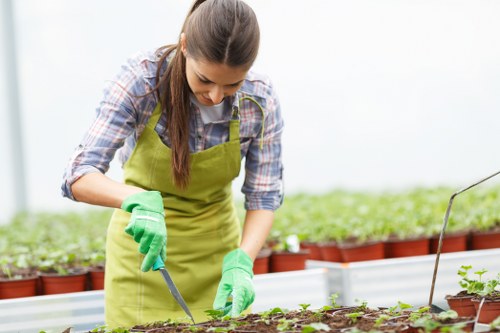
At its core, landscape gardening involves the planning, designing, and maintenance of outdoor spaces. It combines artistic vision with practical considerations to create functional and aesthetically pleasing environments.
In Charlton, the unique climate and soil conditions influence the types of plants and materials that thrive. Successful landscape gardening requires a deep understanding of these local factors to ensure that your garden not only looks beautiful but also remains healthy and sustainable.
By integrating native plants and eco-friendly practices, you can create a garden that supports local wildlife and reduces maintenance efforts. This approach not only benefits the environment but also enhances the overall appeal of your landscape.
- Planning and Design: The foundation of any successful landscape garden.
- Plant Selection: Choosing plants that are suited to Charlton’s climate.
- Maintenance: Keeping your garden healthy and vibrant throughout the year.
Another critical aspect is the use of space. Efficiently utilizing available space ensures that your garden is both functional and visually appealing. Whether you have a small patio or a large yard, thoughtful design can make a significant difference.
Incorporating elements like pathways, patios, and water features can add structure and interest to your landscape. These features not only enhance the beauty of your garden but also provide areas for relaxation and entertainment.
Moreover, considering the seasonal changes and how your garden will evolve throughout the year can help in planning a landscape that remains attractive in all seasons.
Choosing the Right Plants
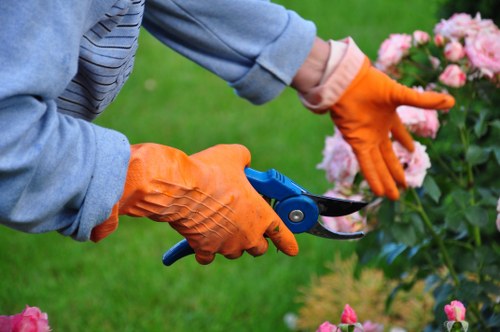
Plant selection is a crucial element in landscape gardening. In Charlton, it’s essential to choose plants that are well-suited to the local climate, soil type, and sunlight conditions.
Opting for native plants can greatly reduce maintenance since they are already adapted to the environment. Native species are also beneficial for local wildlife, providing habitat and food sources for birds, insects, and other creatures.
When selecting plants, consider their growth patterns, color schemes, and seasonal blooms. A diverse mix of plants can add texture and depth to your garden, making it more dynamic and interesting.
- Flowering Plants: Add color and attract pollinators.
- Shrubs and Hedges: Provide structure and privacy.
- Trees: Offer shade and act as focal points.
In addition to aesthetics, it’s important to think about the functional aspects of your plants. For example, incorporating edible plants like herbs and vegetables can add a practical dimension to your garden.
Implementing a mix of evergreen and deciduous plants ensures that your garden has year-round interest. Evergreens provide greenery even in the winter, while deciduous plants offer seasonal color and structure.
Furthermore, considering the maintenance requirements of your plant choices can help in creating a garden that fits your lifestyle. Low-maintenance plants are ideal for those with busy schedules, while high-maintenance plants can be chosen for their unique beauty and contribution to the landscape.
Designing Your Landscape
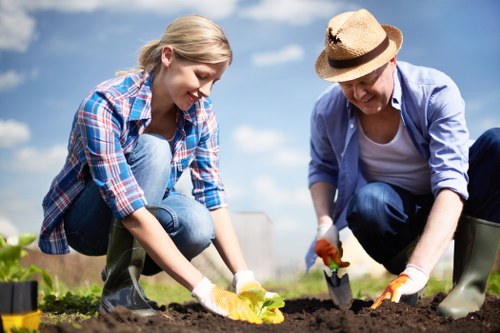
Effective landscape design involves strategically arranging various elements to achieve a balanced and cohesive look. This includes the placement of plants, hardscapes, and decorative features to create a harmonious environment.
Start by assessing your space and identifying the areas that will serve different purposes. For instance, designate spaces for dining, relaxation, gardening, and play areas if you have children.
Hardscaping elements like patios, decks, pathways, and fences add structure to your garden. These features not only enhance the visual appeal but also improve functionality by defining different zones.
- Patios and Decks: Ideal for outdoor dining and gatherings.
- Pathways: Guide visitors through your garden and highlight key areas.
- Water Features: Add a soothing element and can become a focal point.
Incorporating lighting into your landscape design can extend the usability of your garden into the evening hours. Ambient lighting enhances safety, highlights architectural features, and creates a warm and inviting atmosphere.
Additionally, consider the scale and proportion of your elements. Ensuring that plants and structures are appropriately sized will maintain balance and prevent the landscape from feeling cluttered.
Personalizing your garden with decorative elements such as sculptures, benches, and garden art can add character and reflect your personal taste.
Sustainable Landscaping Techniques
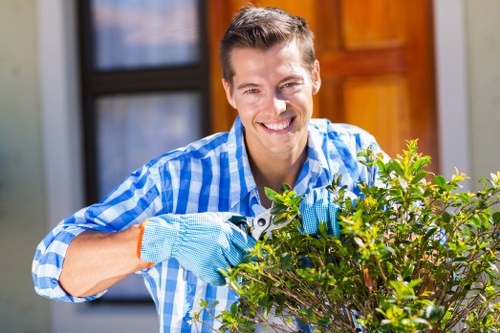
Sustainability is increasingly important in landscape gardening. Implementing eco-friendly practices not only benefits the environment but can also reduce maintenance costs and improve the health of your garden.
Water conservation is a key aspect of sustainable gardening. Installing rain barrels, using drip irrigation systems, and choosing drought-resistant plants can significantly reduce water usage.
Composting is another effective practice that enriches the soil and reduces waste. By recycling organic materials, you create a natural fertilizer that promotes healthy plant growth.
- Rainwater Harvesting: Collects and utilizes rainfall for garden irrigation.
- Drip Irrigation: Delivers water directly to plant roots, minimizing waste.
- Organic Mulch: Retains soil moisture and suppresses weeds.
Soil health is fundamental to a thriving garden. Regularly testing and amending your soil can provide the necessary nutrients and improve its structure, ensuring that plants can grow robustly.
Incorporating native and adapted plants reduces the need for excessive watering and fertilization, making your garden more resilient and easier to maintain.
Additionally, promoting biodiversity in your garden supports beneficial insects and wildlife, creating a balanced ecosystem that enhances the overall health and beauty of your landscape.
Maintaining Your Landscape Garden
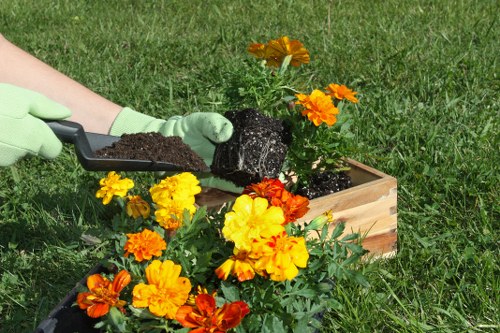
Proper maintenance is essential to keep your landscape garden in Charlton looking its best year-round. Regular care ensures that plants remain healthy, structures are in good condition, and the overall appearance is well-maintained.
Pruning and trimming are necessary to shape plants, promote growth, and prevent overgrowth that can lead to a cluttered appearance. Timely pruning also helps in spotting and addressing any issues such as pests or diseases early on.
Weeding is another important maintenance task. Removing unwanted plants not only keeps your garden tidy but also prevents competition for nutrients and water among the desired plants.
- Regular Watering: Ensures plants receive adequate moisture.
- Fertilizing: Provides essential nutrients for plant growth.
- Mulching: Maintains soil moisture and temperature.
Implementing a maintenance schedule can help in organizing and prioritizing tasks, ensuring that no aspect of your garden is overlooked. Seasonal maintenance tasks, such as leaf removal in the fall or planting new blooms in the spring, keep your garden thriving throughout the year.
Pest control is also a critical part of garden maintenance. Using natural or chemical methods responsibly can protect your plants without harming the surrounding environment.
In Charlton’s climate, understanding the specific maintenance needs based on seasonal changes can help in planning effective care strategies that keep your landscape garden vibrant and healthy all year long.
Conclusion and Call to Action
Landscape gardening in Charlton offers endless possibilities to create beautiful, functional, and sustainable outdoor spaces. By understanding the principles of garden design, plant selection, and maintenance, you can transform your garden into a serene oasis that reflects your personal style and enhances your property’s value.
Whether you choose to embark on the journey yourself or enlist the expertise of professional landscapers, investing in landscape gardening ensures that your outdoor areas are not only visually appealing but also enjoyable and sustainable for years to come.
Ready to transform your outdoor space? Contact us today to schedule a consultation and discover how our landscape gardening services in Charlton can bring your vision to life.

